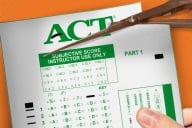You have /5 articles left.
Sign up for a free account or log in.
Sidwell Friends School is an elite private high school known, among other things, for educating the children of Washington's liberal elites. The daughters of Presidents Clinton and Obama attended. The school is well regarded for strong academics and teaching students Quaker ideals of social justice.
But of late the image of the school is suffering amid reports of parental hypercompetitiveness and pressure related to college admissions. The school isn't commenting, but the reports have grown. This spring, the school told parents to stop using blocked phone numbers to call in complaints, to stop circulating rumors about other students and to stop being abusive to counselors and others. Then came news that two of the three college counselors at Sidwell Friends are leaving.
Now comes word that the angry parents of a student who graduated in 2014 sued when all 13 of the colleges to which she applied rejected her. The following year the student applied to, was admitted to and has since graduated from the University of Pennsylvania (one of the places that rejected her as a high school senior).
But her parents -- despite losing in lower courts -- have now filed an appeal with the U.S. Supreme Court, saying that Sidwell Friends engaged in illegal discrimination that harmed their daughter. (The family is Nigerian American and argues that their daughter was the victim of racial discrimination.) The suit argues that the daughter -- Dayo Adetu -- was the only high school senior that year not admitted to college (although it is possible that other students did not focus their applications entirely on highly competitive colleges).
The Supreme Court and other courts have considered lawsuits against colleges over alleged discrimination -- most notably in recent years in suits brought by critics of affirmative action who have argued that white and Asian students are suffering discrimination. But suing a high school over admissions denials -- and then taking that case to the Supreme Court -- is highly unusual.
The Supreme Court has not indicated whether it will hear the case, and the odds are typically against the high court taking any appeal. It could reject the case as soon as this week.
Some of the case concerns actions that (if true -- and Sidwell Friends disputes many of the facts) could be seen as discriminatory. The family accuses the school of retaliating against them for complaints filed about an older child, and there is extensive legal back-and-forth over scores on some math tests and grades in mathematics courses.
But some issues raised (and lower courts' review of these issues) provide some insights into how the actions of high school counselors are scrutinized.
For instance, one part of the argument by Adetu's parents was that the college counselor at Sidwell Friends implied that their daughter was not an American citizen by noting, in a letter of recommendation, Adetu's Nigerian heritage (she is an American whose family is from Nigeria). The appeals court rejected this argument for several reasons, including that Adetu had herself written about her Nigerian heritage in her college essay and had testified in the legal proceedings that she was not offended that her counselor had included the information.
The Adetu lawsuit also focuses on the boxes checked by their daughter's counselor in the Secondary School Report, in which the counselor is asked to evaluate students, compared to others at the high school, on academic achievement. Boxes could be checked ranging from "below average" to "outstanding."
The suit notes that the Sidwell counselor checked "good" or "very good" for their daughter's applications to Dartmouth College and Columbia, Cornell, Johns Hopkins and Yale Universities, among others. But when the counselor filled out the form for Adetu's application to historically black Spelman College, the counselor checked "excellent."
Adetu testified that she viewed the box checked for the Spelman application as evidence that Sidwell undervalued her academic accomplishments when she applied to predominantly white colleges and universities. Her lawyers said that a counselor should be checking the same box for all applications.
But Sidwell argued, and the appeals court said that there was no evidence to counter, a different interpretation. The counselor testified that she compares applicants to others from Sidwell applying to the same college. So it is possible that, compared to those applying to one college, a student may be stronger than when compared to those applying to another college.








